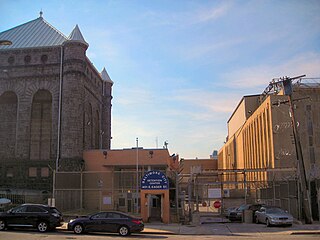
The Mississippi Department of Corrections (MDOC) is a state agency of Mississippi that operates prisons. It has its headquarters in Jackson. As of 2020 Burl Cain is the commissioner.
Probation in criminal law is a period of supervision over an offender, ordered by the court often in lieu of incarceration.

The Maryland Department of Public Safety and Correctional Services (DPSCS) is a government agency of the State of Maryland that performs a number of functions, including the operation of state prisons. It has its headquarters in Towson, Maryland, an unincorporated community that is also the seat of Baltimore County, Maryland, United States, located north of Maryland's largest city of Baltimore. Additional offices for correctional institutions supervision are located on Reisterstown Road in northwest Baltimore.

A probation or parole officer is an official appointed or sworn to investigate, report on, and supervise the conduct of convicted offenders on probation or those released from incarceration to community supervision such as parole. Most probation and parole officers are employed by the government of the jurisdiction in which they operate, although some are employed by private companies that provide contracted services to the government.

The California Department of Corrections and Rehabilitation (CDCR) is the penal law enforcement agency of the government of California responsible for the operation of the California state prison and parole systems. Its headquarters are in Sacramento.

CoreCivic, formerly the Corrections Corporation of America (CCA), is a company that owns and manages private prisons and detention centers and operates others on a concession basis. Co-founded in 1983 in Nashville, Tennessee by Thomas W. Beasley, Robert Crants, and T. Don Hutto, it received investments from the Tennessee Valley Authority, Vanderbilt University, and Jack C. Massey, the founder of Hospital Corporation of America.

A prison officer or corrections officer (CO) also known as a Correctional Law Enforcement Officer or less formally as a prison guard is a uniformed law enforcement official responsible for the custody, supervision, safety, and regulation of prisoners. They are responsible for the care, custody, and control of individuals who have been convicted of a crime and sentenced to imprisonment. They are also responsible for the security of the facility and its property as well as other law enforcement functions. Most prison officers or corrections officers are employed by the government of the jurisdiction in which they operate, although some are employed by private companies that provide prison services to the government.

The New York State Department of Corrections and Community Supervision (NYSDOCCS) is the department of the New York State government that maintains the state prisons and parole system. The New York State prison system encompasses 44 prisons funded by the state government. This does not include other jails and prisons in New York State such as federal prisons, New York City jails, or county jails.

The New Jersey Department of Corrections (NJDOC) is the government agency responsible for operations and management of prison facilities in the U.S. state of New Jersey. The New Jersey Department of Corrections operates 9 correctional facilities, 11 Residential Community Release Programs, and 1 Assessment Center. The department is headquartered in Trenton.

The Hawaii Department of Public Safety is a department within the executive branch of the government of the U.S. state of Hawaii. It is headquartered in the 919 Ala Moana Boulevard building in Honolulu, Hawaii. The Department of Public Safety is made up of three divisions: Administration, Corrections, and Law Enforcement.

The GEO Group, Inc. (GEO) is a publicly traded C corporation that invests in private prisons and mental health facilities in North America, Australia, South Africa, and the United Kingdom. Headquartered in Boca Raton, Florida, the company's facilities include illegal immigration detention centers, minimum security detention centers, and mental-health and residential-treatment facilities. It also operates government-owned facilities pursuant to management contracts. As of December 31, 2021, the company managed and/or owned 86,000 beds at 106 facilities. In 2019, agencies of the federal government of the United States generated 53% of the company's revenues. Up until 2021 the company was designated as a real estate investment trust, at which time the board of directors elected to reclassify as a C corporation under the stated goal of reducing the company's debt.

The Texas Department of Criminal Justice (TDCJ) is a department of the government of the U.S. state of Texas. The TDCJ is responsible for statewide criminal justice for adult offenders, including managing offenders in state prisons, state jails, and private correctional facilities, funding and certain oversight of community supervision, and supervision of offenders released from prison on parole or mandatory supervision. The TDCJ operates the largest prison system in the United States.

The New Jersey State Parole Board is a governmental body in the U.S. State of New Jersey that is responsible for assisting offenders to reenter society as law-abiding residents. To improve the safety of the public and the quality of life in New Jersey by administering an innovative parole system that addresses the needs of the community, victims, and offenders through a responsible decision-making process that provides every available opportunity for successful offender reintegration.
The Miami-Dade Corrections & Rehabilitation Department (MDCR) is a County Department serving all of Miami-Dade County's 30 municipal police departments, the county police department (MDPD), as well as state agencies. The MDCR is the 7th largest county jail system in the United States, with approximately 2,906 employees. [FY 2009–10] The Department is still often referred by its former name, DCJ for Dade County Jail. Miami-Dade Corrections Officers are easily identified by their white shirts with green trousers with gray stripe. Miami-Dade Corrections vehicles are identified by their green and white livery. MDCR officers carry silver badges, while officers with the ranks of sergeant and above carry gold badges. The badge is exactly the same as the Miami-Dade County Police Department to reflect the fact that they were at one time one entity. The MDCR operates six detention facilities with a system-wide average of approximately 7,000 inmates, and books approximately 114,000 inmates annually. Several facilities are nationally accredited by the American Correctional Association, as well as at the state level by the Florida Corrections Accreditation Commission. The current director of the department is Daniel Junior, who was appointed by Miami-Dade Mayor Carlos Giménez. The Department's headquarters is located at 2525 NW 62nd Street, Miami, Florida.
The Louisville Metro Department of Corrections (LMDC), known locally as Metro Corrections, is a local corrections agency/jail system responsible for the booking and incarceration of inmates and arrestees in Louisville, Kentucky. The agency was previously known as the Jefferson County Corrections Department, but the name was changed with the merger of city and county governments in 2003.

Baltimore City Detention Center is a Maryland Department of Public Safety and Correctional Services state prison for men and women. It is located on 401 East Eager Street in downtown Baltimore, Maryland. It has been a state facility since July 1991.

Decarceration in the United States involves government policies and community campaigns aimed at reducing the number of people held in custody or custodial supervision. Decarceration, the opposite of incarceration, also entails reducing the rate of imprisonment at the federal, state and municipal level. As of 2019, the US was home to 5% of the global population but 25% of its prisoners. Until the COVID-19 pandemic, the U.S. possessed the world's highest incarceration rate: 655 inmates for every 100,000 people, enough inmates to equal the populations of Philadelphia or Houston. The COVID-19 pandemic has reinvigorated the discussion surrounding decarceration as the spread of the virus poses a threat to the health of those incarcerated in prisons and detention centers where the ability to properly socially distance is limited. As a result of the push for decarceration in the wake of the pandemic, as of 2022, the incarceration rate in the United States declined to 505 per 100,000; meaning that the United States no longer has the highest incarceration rate in the world.
The Central Arizona Florence Correctional Complex, is a privately owned and operated managed prison located in Florence, Pinal County, Arizona. The facility is run by Corrections Corporation of America and houses prisoners for the United States Marshals Service (USMS), TransCor America LLC, U.S. Immigration and Customs Enforcement (ICE), Pascua Yaqui Tribe, United States Air Force, City of Coolidge, and City of Mesa. The majority are awaiting the resolution of their trials. The current population is male and female.
Electronic monitoring or electronic incarceration (e-carceration) is state use of digital technology to monitor, track and constrain an individual's movements outside of a prison, jail or detention center. Common examples of electronic monitoring of individuals under pre-trial or immigrant detention, house arrest, on probation or parole include: GPS wrist and ankle monitors, cellphones with biometric security systems, ignition interlock devices and automated probation check-in centers or kiosks.















